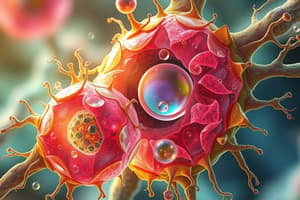Podcast
Questions and Answers
Which statement accurately describes prokaryotic cells?
Which statement accurately describes prokaryotic cells?
- They have a nucleus and multiple organelles.
- They are exclusively found in multicellular organisms.
- They are larger and more complex than eukaryotic cells.
- They lack a nucleus and membrane-bound organelles. (correct)
What is the primary function of the mitochondria?
What is the primary function of the mitochondria?
- Storage of genetic information.
- Photosynthesis.
- Protein synthesis.
- ATP production through cellular respiration. (correct)
Which part of the cell is responsible for modifying and packaging proteins?
Which part of the cell is responsible for modifying and packaging proteins?
- Golgi Apparatus. (correct)
- Lysosomes.
- Ribosomes.
- Endoplasmic Reticulum.
During mitosis, which stage involves the separation of sister chromatids?
During mitosis, which stage involves the separation of sister chromatids?
Which of the following correctly defines meiosis?
Which of the following correctly defines meiosis?
What is the primary role of ribosomes in the cell?
What is the primary role of ribosomes in the cell?
Which transport mechanism does NOT require energy input?
Which transport mechanism does NOT require energy input?
What process converts light energy into chemical energy in plant cells?
What process converts light energy into chemical energy in plant cells?
Flashcards are hidden until you start studying
Study Notes
Prokaryotic Cells
- Lack a nucleus and other membrane-bound organelles
- Have a simpler structure compared to eukaryotic cells
- Found in bacteria and archaea
Mitochondria
- Powerhouse of the cell
- Responsible for cellular respiration
- Produces ATP (adenosine triphosphate), the primary energy currency of cells
Golgi Apparatus
- Modifies, sorts, and packages proteins synthesized by ribosomes
- Acts like a post office, directing proteins to their final destination
Anaphase
- Stage of mitosis where sister chromatids separate and move to opposite poles of the cell
- Ensures that each daughter cell receives a complete set of chromosomes
Meiosis
- Cell division process that produces gametes (sex cells) with half the number of chromosomes as the parent cell
- Essential for sexual reproduction and genetic diversity
Ribosomes
- Sites of protein synthesis
- Read messenger RNA (mRNA) and translate it into proteins
Passive Transport
- Movement of substances across cell membranes without requiring energy
- Driven by concentration gradients or pressure differences
Photosynthesis
- Process by which plants, algae, and some bacteria convert light energy into chemical energy stored in glucose
- Occurs in chloroplasts and uses chlorophyll to capture sunlight
Studying That Suits You
Use AI to generate personalized quizzes and flashcards to suit your learning preferences.





